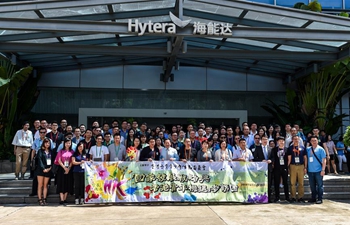BERLIN, June 27 (Xinhua) -- Children who grow up in single-income households in Germany face a much greater risk of experiencing poverty, a study published on Wednesday by the Bertelsmann Foundation finds.
According to the study, 32 percent of children in single-income families experienced either permanently or recurring situations of poverty. By contrast, only 4.1 percent of children were affected when both parents held full-time jobs. Even if one of the two parents only pursued a part-time occupation, the risk of poverty was dramatically reduced.
Joerg Draeger, board member of the Bertelsmann Foundation, described the figures published on Wednesday as alarming. "Child poverty decisively depends on the employment status of women. Irrespective of being a two-parent or a single-parent family: we have to take steps to enable mothers to work," a statement by Draeger read.
At the same time, children needed care and time spent with their parents which was often difficult to combine with full employment because of inflexibility of the German labor market. The Bertelsmann Foundation highlighted that child poverty in Germany did not necessarily imply homelessness or hunger, but frequently went hand in hand with restrictions concerning social and cultural participation in their community.
Seventy-five percent of children who grew up financially secured were active in associations and clubs compared to less than 40 percent of their peers raised in permanent poverty. This discrepancy at least partially owed to the financial circumstances of their parents, as relative material deprivation made it more difficult to invite friends home and pursue common interests.
In response to the findings, the Bertelsmann Foundation proposed a range of new policies to reduce child poverty. The Guetersloh-based think-tank called for a more precise assessment of the differential needs of German children legislation, as well as a more comprehensive national coverage of high-quality education and childcare.
Additionally, the study argued that government support in form of a so-called "Teilhabegeld" should be introduced to replace and bundle existing state benefits for children in a single measure.
Speaking to Xinhua, Bertelsmann expert Sarah Menne emphasized that the "Teilhabegeld" offered a promising evidence-based way to alleviate child poverty. Menne argued that unlike simply raising the level of existing transfers, as announced by the government on Wednesday, which did "not reach those who need it most", means-tested funding would be both fairer and more effective.
Menne further called on the German government to refrain from actively pressuring more mothers into joining the workforce. Legislators needed to establish the necessary "framework conditions" which widened the choices available to families. In particular, Germany had a "tremendous need to catch up" compared to other European countries, who have a better provision of childcare facilities with longer opening hours, as well as more flexible working arrangements.













